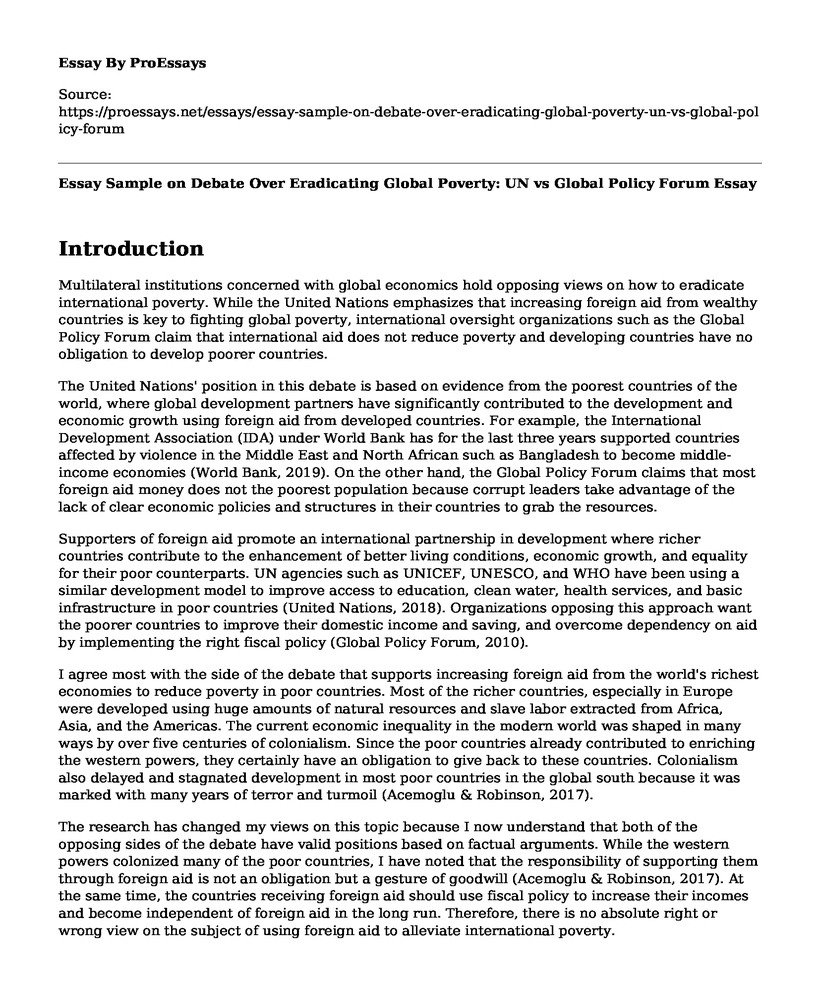Introduction
Multilateral institutions concerned with global economics hold opposing views on how to eradicate international poverty. While the United Nations emphasizes that increasing foreign aid from wealthy countries is key to fighting global poverty, international oversight organizations such as the Global Policy Forum claim that international aid does not reduce poverty and developing countries have no obligation to develop poorer countries.
The United Nations' position in this debate is based on evidence from the poorest countries of the world, where global development partners have significantly contributed to the development and economic growth using foreign aid from developed countries. For example, the International Development Association (IDA) under World Bank has for the last three years supported countries affected by violence in the Middle East and North African such as Bangladesh to become middle-income economies (World Bank, 2019). On the other hand, the Global Policy Forum claims that most foreign aid money does not the poorest population because corrupt leaders take advantage of the lack of clear economic policies and structures in their countries to grab the resources.
Supporters of foreign aid promote an international partnership in development where richer countries contribute to the enhancement of better living conditions, economic growth, and equality for their poor counterparts. UN agencies such as UNICEF, UNESCO, and WHO have been using a similar development model to improve access to education, clean water, health services, and basic infrastructure in poor countries (United Nations, 2018). Organizations opposing this approach want the poorer countries to improve their domestic income and saving, and overcome dependency on aid by implementing the right fiscal policy (Global Policy Forum, 2010).
I agree most with the side of the debate that supports increasing foreign aid from the world's richest economies to reduce poverty in poor countries. Most of the richer countries, especially in Europe were developed using huge amounts of natural resources and slave labor extracted from Africa, Asia, and the Americas. The current economic inequality in the modern world was shaped in many ways by over five centuries of colonialism. Since the poor countries already contributed to enriching the western powers, they certainly have an obligation to give back to these countries. Colonialism also delayed and stagnated development in most poor countries in the global south because it was marked with many years of terror and turmoil (Acemoglu & Robinson, 2017).
The research has changed my views on this topic because I now understand that both of the opposing sides of the debate have valid positions based on factual arguments. While the western powers colonized many of the poor countries, I have noted that the responsibility of supporting them through foreign aid is not an obligation but a gesture of goodwill (Acemoglu & Robinson, 2017). At the same time, the countries receiving foreign aid should use fiscal policy to increase their incomes and become independent of foreign aid in the long run. Therefore, there is no absolute right or wrong view on the subject of using foreign aid to alleviate international poverty.
Conclusion
In my opinion, the topic of international poverty affects all industries in the market place. However, it has the greatest impact on the financial and manufacturing industries, which tend to thrive when more people have surplus income to spend. An increase in global poverty leads to a decline in these industries. On the other hand, when poverty statistics decline, financial and manufacturing industries rise.
References
Acemoglu, D., & Robinson, J. (2017, January 30). The economic impact of colonialism. VOX, CEPR Policy Portal. https://voxeu.org/article/economic-impact-colonialism
Global Policy Forum. (2010, February). Why International Assistance Does not Alleviate Poverty. https://www.globalpolicy.org/social-and-economic-policy/financing-for-development-1-45/international-aid-1-126/48610-why-international-assistance-does-not-alleviate-poverty.html
United Nations. (2018, October). Increased Aid, Development Critical to Eradicating Global Poverty, Delegates Stress in Second Committee. Welcome to the United Nations. https://www.un.org/press/en/2018/gaef3502.doc.htm
World Bank. (2019, December 5). Why Wealthy Countries Must Step Up Their Contribution to Fight Global Poverty. https://www.worldbank.org/en/news/opinion/2019/12/05/why-wealthy-countries-must-step-up-their-contribution-to-fight-global-poverty
Cite this page
Essay Sample on Debate Over Eradicating Global Poverty: UN vs Global Policy Forum. (2023, Apr 24). Retrieved from https://proessays.net/essays/essay-sample-on-debate-over-eradicating-global-poverty-un-vs-global-policy-forum
If you are the original author of this essay and no longer wish to have it published on the ProEssays website, please click below to request its removal:
- Essay Example on Interconnectedness
- Paper Example on Different Waves of Feminism in Canadian History
- Essay Sample on Identification and Prevention of Risk Behaviors in Sexually Abused Adolescents
- Essay Sample on Children Witnessing Domestic Abuse: 3M+ Kids Face Painful Reality
- Facing the Pain of Violence and Crime: A Community Struggle - Essay Sample
- Paper Example on A Massive Life Change: The Story of Alcoholics Anonymous
- Free Paper on Tobacco Abuse: A Growing Global Threat to Human Health







